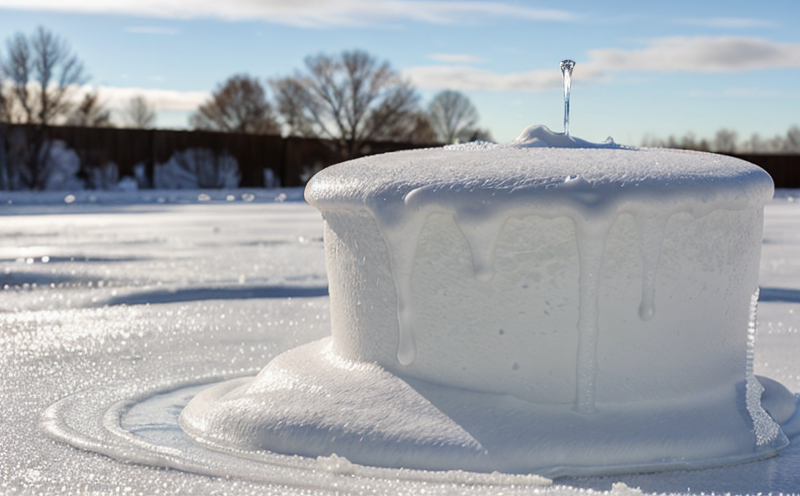ISO 11079 Cold Weather Comfort & Icing Impact Testing
The ISO 11079 standard is pivotal in ensuring that aerospace and aviation equipment can withstand cold weather conditions, including icing environments. This testing protocol is essential for manufacturers to achieve regulatory compliance and ensure product reliability under harsh environmental conditions. The test simulates the stresses experienced by aircraft components during flight through icy and cold conditions, helping engineers understand potential areas of failure.
The process involves subjecting samples to controlled temperatures and humidity levels that mimic real-world icing scenarios. This includes spraying ice crystals onto the specimen to replicate in-flight icing conditions. The testing is crucial for verifying thermal comfort systems within aircraft cabins as well as the structural integrity of various components like wings, engines, and fuselage.
The ISO 11079 protocol also evaluates the performance of de-icing fluids and systems, which are critical for safety during icy weather conditions. This involves spraying de-icing fluid on a specimen to ensure it can effectively shed ice without causing damage. The testing ensures that these systems adhere to international standards, providing passengers and crews with peace of mind.
For quality managers and compliance officers, this test is indispensable as it provides a clear pathway to meet regulatory requirements set by aviation authorities worldwide. R&D engineers benefit from the insights gained into material properties under cold weather conditions, which can guide future product development. For procurement teams, ISO 11079 testing ensures that only suppliers meeting stringent international standards are chosen.
The test setup is intricate and requires precise control over environmental parameters to ensure accurate results. Specimen preparation involves selecting materials representative of the components or systems under test. The apparatus used includes climate chambers capable of simulating a range of temperatures and humidity levels, along with specialized spraying equipment for ice crystal application.
Acceptance criteria are stringent and based on performance metrics such as cabin temperature distribution, component integrity, and effectiveness of de-icing fluids. Engineers analyze these metrics to determine if the specimen meets the required standards. The reporting phase involves detailed documentation of test parameters, results, and any deviations from expected outcomes. This data is crucial for quality assurance processes and continuous improvement.
Understanding the implications of cold weather on aircraft performance is critical in today's aviation industry. By adhering to ISO 11079 standards, manufacturers can enhance safety and reliability, which are paramount in this high-stakes sector.
- Why Choose This Test: Compliance with international regulations, enhanced product reliability, improved safety, and compliance with quality assurance protocols.
- Industry Applications: Cabin comfort systems, engine performance under icing conditions, wing integrity checks, and de-icing fluid effectiveness verification.
Industry Applications
The ISO 11079 test is widely used across the aerospace and aviation industries to ensure that all components and systems can withstand cold weather and icing conditions. Cabin comfort systems benefit from this testing as it ensures that passengers are not subjected to excessive cold or discomfort during flights in icy regions.
Engine performance under icing conditions is critical for safety, especially at high altitudes where ice formation can disrupt engine functionality. By simulating these conditions, engineers can identify potential issues and implement design changes to enhance reliability.
The integrity of wings and other structural components is also tested using this protocol. Ice accumulation on wings can alter aerodynamics, leading to increased drag or reduced lift. Ensuring that structures can withstand icing without compromising their performance is essential for maintaining flight safety.
De-icing fluid effectiveness verification is another key application. These fluids are crucial in keeping aircraft safe during icy weather conditions by preventing the formation of ice on critical surfaces. Testing ensures that these fluids do not only perform their intended function but also do so safely and effectively without causing damage to the aircraft.
The results from ISO 11079 testing provide valuable insights for both manufacturers and operators, enabling them to make informed decisions about product design and operational procedures. This contributes significantly to the overall safety and efficiency of the aviation industry.
Why Choose This Test
- Regulatory Compliance: Ensures adherence to international standards for cold weather and icing conditions.
- Enhanced Safety: Identifies potential issues before they become critical safety hazards.
- Improved Reliability: Provides confidence in the performance of aircraft components under challenging environmental conditions.
- Informed Decision-Making: Offers valuable data for R&D and quality assurance processes.
Environmental and Sustainability Contributions
The ISO 11079 test plays a crucial role in promoting sustainability within the aviation industry. By ensuring that aircraft components can withstand icy conditions, it helps reduce the frequency of maintenance checks, thereby lowering overall operational costs. This leads to more efficient flights with minimal environmental impact.
Additionally, by enhancing the reliability and longevity of aircraft systems, ISO 11079 supports sustainable practices by minimizing fuel consumption and emissions. This is particularly important as airlines strive to reduce their carbon footprint in line with global sustainability goals.





